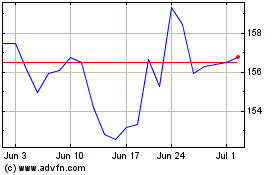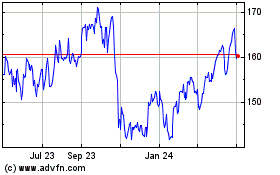Mexico Awards Oil Rights -- WSJ
December 06 2016 - 3:02AM
Dow Jones News
BHP Billiton, Chevron, CNOOC grab offshore blocks in nation's
first test of foreign interest
By Robbie Whelan and Anthony Harrup
MEXICO CITY -- The world's largest oil companies won rights to
develop Mexico's offshore oil deposits in an auction that led to
twice as many awards as officials expected and could generate $40
billion in investment.
Eight of the 10 exploration blocks available were snatched up in
competitive bidding by firms including Exxon Mobil Corp., Chevron
Corp., and China's state-run China National Offshore Oil Corp.
Australia's BHP Billiton also made history by becoming the first
foreign company to join state oil firm Petróleos Mexicanos in
developing the already discovered Trion oil field in the Gulf of
Mexico.
The Trion partnership and the deep-water auctions were the
centerpiece of President Enrique Peña Nieto's 2013 energy reform
laws, which opened Mexico's energy industry to foreign investment
for the first time since nationalization in 1938.
"We've very happy that this investment will come to Mexico,"
said Juan Carlos Zepeda, head of the country's energy regulator,
the National Hydrocarbons Commission. "The energy reform initiated
by President Pena is a success."
Mexican energy officials said the eight blocks plus Trion
eventually should lead to production of 900,000 barrels a day of
oil equivalent.
BHP Billiton outbid BP PLC for a 60% stake in the Trion field,
believed to contain 485 million barrels of crude oil, by offering a
bonus payment $624 million, just $18 million more than its British
rival.
Among the biggest winners was China's Cnooc, which won rights to
explore and develop two blocks in the oil-rich central portion of
the Gulf of Mexico. Cnooc offered some of the highest royalty
payments, committing to pay 15.01% of its gross income on one block
and 17.01% on another.
"We salute that the Chinese business has come to compete in
Mexico and to win," said Pedro Joaquín Coldwell, Mexico's Secretary
of Energy. "When we talk about diversification, we don't only refer
to the scale of the companies...we also refer to
nationalities."
"The way the Chinese are approaching Mexico's energy industry is
very similar to the way they approached Brazil," said R. Evan Ellis
a Latin American studies professor at the U.S. Army War College,
referring to the policy of investing in small companies and setting
up investment funds first, then taking exploratory steps to develop
caches of resources.
Cnooc couldn't be reached for comment.
Other successful foreign bidders include a consortium included
France's Total SA alongside Statoil ASA and BP, and another group
including Murphy Oil Corp., Ophir Energy and Malaysia's Petronas
Carigali.
Aside from securing a partner for Trion, Pemex won one block in
a consortium with Chevron and Japan's Inpex Corp., and lost in
another in which it bid alone.
They were the first competitive bids for Pemex, which had a
monopoly on oil exploration and production in Mexico since
1938.
"Pemex is realizing the need to change and adjusting to the new
reality, " said Pablo Medina, a Latin America upstream analyst at
energy research firm Wood Mackenzie.
For Trion, both Billiton and BP offered additional royalties of
4%, on top of the minimum royalty payment of 7.5%, while Billiton
offered an additional cash commitment of $624 million, higher than
the $606 million offered by BP.
Billiton will have 60% of the project and Pemex 40%, and as
winning bidder is obliged to make a minimum investment of $570
million.
Timothy Callahan, a director general with BHP Billiton, said his
company became more confident in its bid after Pemex in early
November changed certain terms in the Trion joint operating
agreement, including voting procedures governing the contract.
The auction is the fourth under the 2013 opening of the Mexican
oil industry, but the first for deep-water reserves and the first
to attract the interest of major oil companies.
The Trion field was discovered in 2012 and is thought to contain
about 485 million barrels of commercial reserves. It is expected to
cost about $11 billion to develop the field, with capital
expenditures of $7.5 billion, according to Mexican oil regulator
National Hydrocarbons Commission.
Write to Robbie Whelan at robbie.whelan@wsj.com and Anthony
Harrup at anthony.harrup@wsj.com
(END) Dow Jones Newswires
December 06, 2016 02:47 ET (07:47 GMT)
Copyright (c) 2016 Dow Jones & Company, Inc.
Chevron (NYSE:CVX)
Historical Stock Chart
From Mar 2024 to Apr 2024

Chevron (NYSE:CVX)
Historical Stock Chart
From Apr 2023 to Apr 2024
